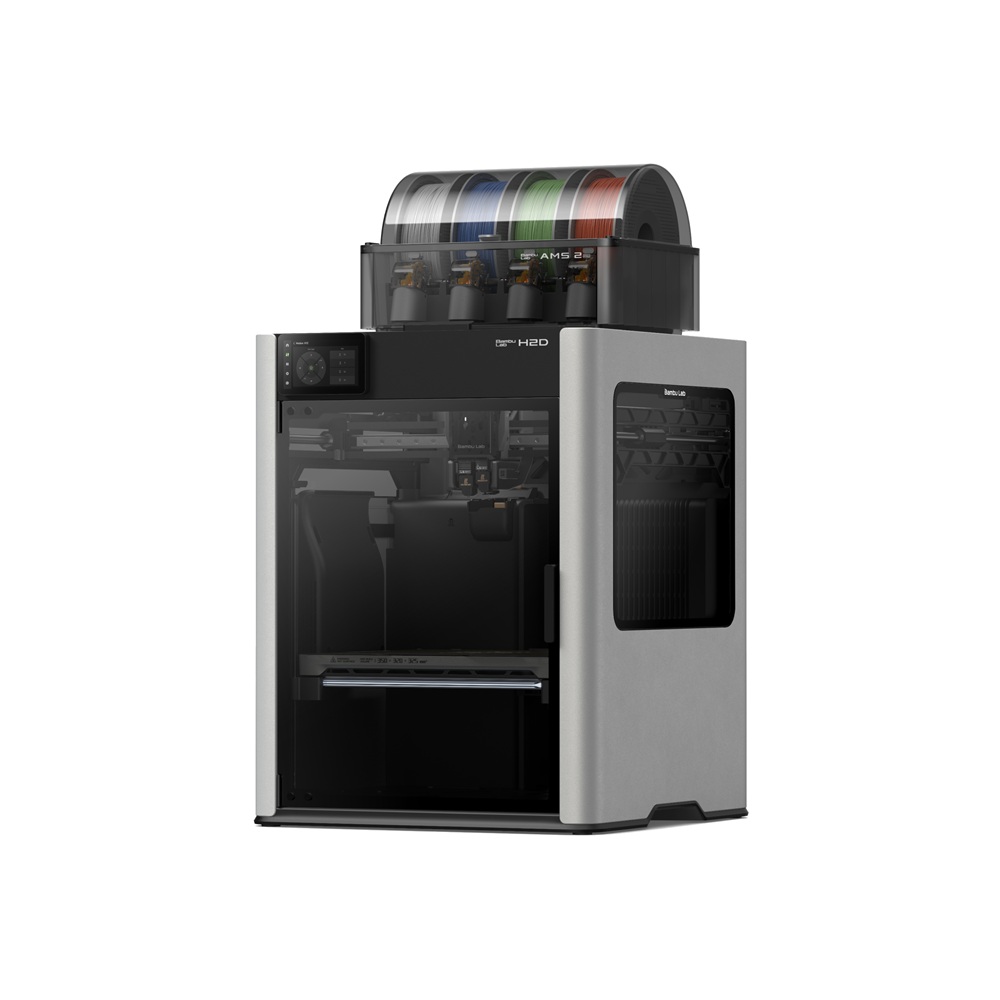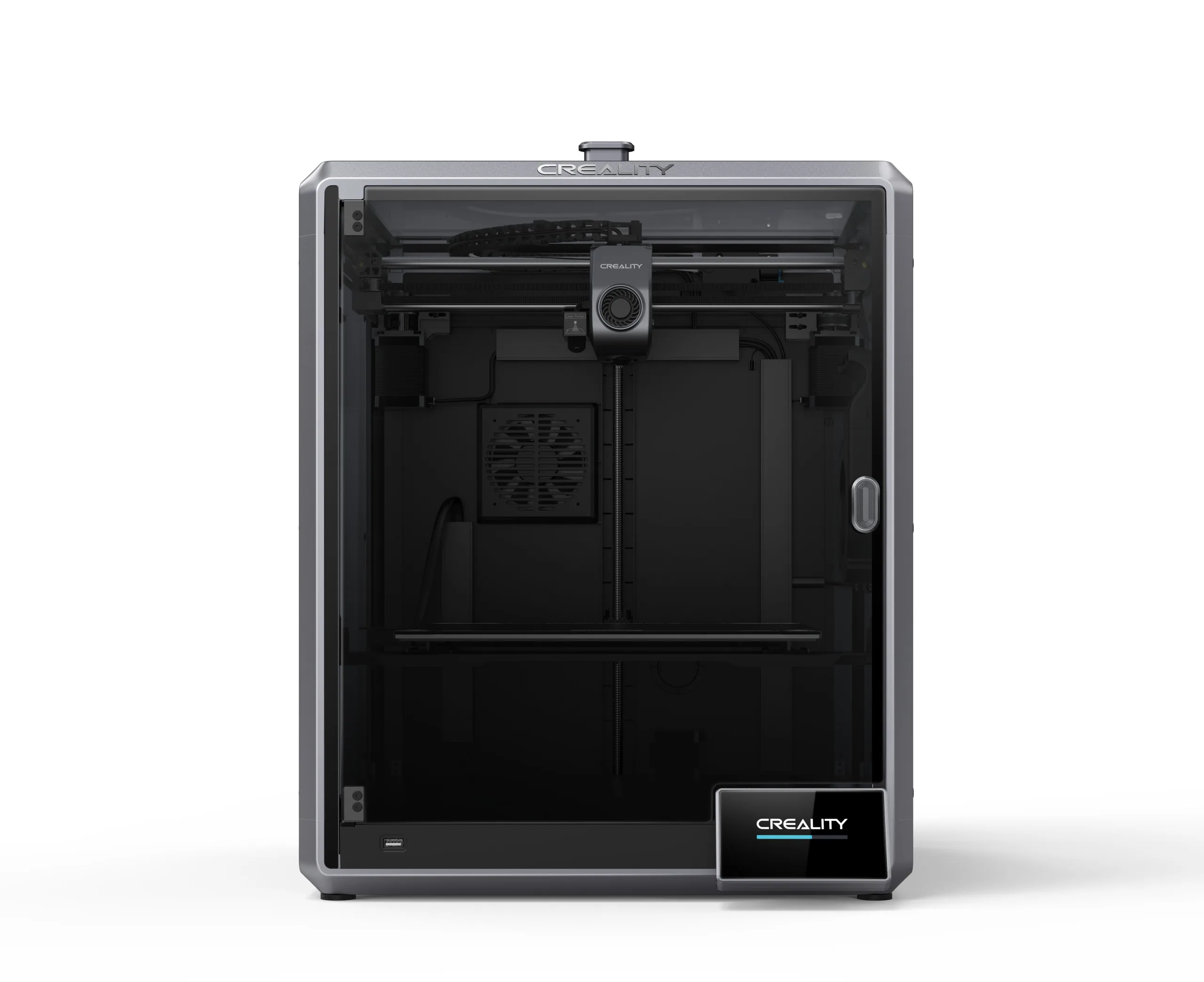Compare H2D vs K1 Max
Comparison between the best 3D printers
Choose the best 3D printer at the best price. The cheapest 3D printers are here.
Buy a 3D printer here with 3D Fila.
 |
 |
|
| Model | H2D |
K1 Max[BUY K1 Max] |
| Printing Material | Filament | Filament |
| Buy Filament for Bambu Lab H2D | Buy Filament forCreality 3D K1 Max | |
| Estimated price | $1899,00 | $1300,00 |
| Manufacturer | Bambu Lab | Creality 3D |
| Release Year | 2025 | 2023 |
| Print Volume [mm] | 350x320x325 | 300x300x300 |
| Printer Size [mm] | 492x514x626 | 435x462x526 |
| Weight [kg] | 42,3 | 18 |
| Power Loss Recovery | YES | YES |
| Enclosed printer | YES | YES |
| Bed Leveling | Automatic | Automatic |
| Filament End Sensor | YES | YES |
| Bed type | Heated | Heated |
| Power supply system | Direct Drive | Direct Drive |
| Standard nozzle | 0,4 | 0,4 |
| Maximum Nozzle Temperature [°C] | 350 | 300 |
| Maximum Bed Temperature [°C] | 120 | 100 |
| Maximum printing speed [mm/s] | 600 | 600 |
| Filament holder | YES | YES |
| Camera for supervision | YES | YES |
| Recommended filaments | PLA, PETG, ABS, ASA, TPU, PVA, Nylon (PA) | ABS, PLA, PETG, TPU, PA, ASA, PC, PLA-CF, PA-CF, PET-CF |
| Recommended slicers | Bambu Studio | Creality Print, Cura, Simplify, Slic3r, IdeaMaker e outros |
| Maximum Resolution [mm] | 0,01 | 0,1 |
| Processor | ||
| Display | Touchscreen 5'' | Display touchscreen 4,3'' |
| Power Supply | ||
| Connectivity | Wifi, Bambu bus, Cartão SD | USB / Wi-Fi / Ethernet |
| Operating systems | Windows, Mac, Linux | Windows, Mac, Linux |
| Date of registration in the system | 2025-03-31 | 2023-12-01 |
| Release date | 2025 | 2023 |
| Extra features | Bambu Labs H2D combines high-speed 3D printing with a chamber heated up to 65 °C, dual extrusion with automatic nozzle switching, an AMS for filament drying and exchange, and AI sensors that detect failures. It offers optional laser and digital cutting capabilities, features intelligent calibration through computer vision, vibration control, enhanced fire safety, and real-time camera monitoring. | The Creality K1 Max stands out as a fast Core XY 3D printer with a large build volume of 300 x 300 x 300 mm. It is fully enclosed and equipped with AI sensors to prevent print failures. This model has a smooth and flexible PEI build platform, and uses an automatic leveling system with LIDAR, as well as a filament run-out sensor. LAN, Creality Cloud and USB Flash Disk connectivity are available, as well as a 4.3-inch touchscreen interface. The K1 Max is robust, weighing in at 18 kg, and includes an AI camera and limited version of the Klipper firmware. Its motion system is solid and the printer is efficient with high-temperature filaments, but it is not silent. Assembly is 99% complete, requiring only minor adjustments before use. |
| Support for multiple colors and materials (AMS and CFS) | YES | NO |
Notes * |
||
| Cost-benefit | 7 / 10 | 7 / 10 |
| Hardware | 7.2 / 10 | 4.2 / 10 |
| Tela | . | . |
| Print volume | 4 / 10 | 4 / 10 |
| Performance | 5 / 10 | 5 / 10 |
| [BUY K1 Max] |
Conclusion |
| In conclusion, both the Bambu Lab H2D and the Creality 3D K1 Max are robust 3D printers, each catering to different user needs and preferences. The H2D, with its larger print volume and cutting-edge features such as dual extrusion and intelligent calibration, positions itself as a more advanced option, making it suitable for users who require high-speed printing and versatility in materials. Conversely, the K1 Max offers a strong blend of performance and ease of use while being more budget-friendly, making it an attractive option for hobbyists and those who prioritize a balance between affordability and functionality. While both printers incorporate automatic bed leveling, filament sensors, and enclosure, the H2D edges out in terms of maximum temperature capabilities and additional features like AI sensors for failure detection and filament management. The K1 Max, while slightly behind in some technical aspects, still delivers excellent performance, especially for those who may not need the extensive features of the H2D. Ultimately, your choice may hinge on budget considerations and printing requirements. If advanced features and larger capacities are essential, the H2D may justify its higher price. However, for users seeking a reliable printer at a lower cost, the K1 Max remains a commendable option. |

